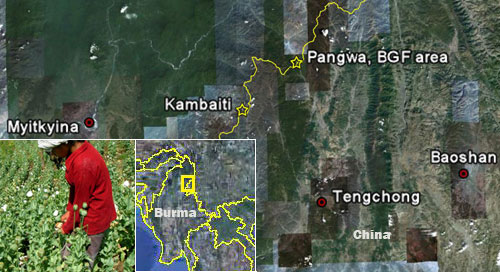The military-backed Burmese government collected an opium tax during the recent opium season in Kachin State in the country’s north while implementing a fifteen-year drug eradication mission, sources said.
The opium season in Kachin State lasted from October 2010 to March 2011, unlike Shan State, where only one crop per year is cultivated.

The Burmese Army and government anti-narcotic police occasionally visited the opium fields in the government-controlled Waingmaw Township during the season and collected tax from the crop owners, local witnesses said.
opium_field_burmaRecently, the opium was mainly cultivated in the areas in Waingmaw Township controlled by the Border Guard Force (BGF), which is under control of the Burmese Army. It was formerly known as the New Democratic Army-Kachin (NDA-K), led by Zahkung Ting Ying.
The NDA-K was transformed into three battalions of the BGF in November, 2009. The battalions are No. 1001, No. 1002 and No. 1003.
Control over opium cultivation in the area was granted to the BGF until 2014 by the Burmese central government, BGF officials said.
An estimated 20,000 acres of opium were cultivated in the BGF-controlled areas of Sadung and the areas between Kambaiti and Pangwa towns, according to the War Against Drug Committee of the Kachin Independence Organization (KIO).
During the KIO’s Anti-drug Campaign in Waingmaw Township from the mid-October last year to March, 2011, it prevented over 6,000 acres from being planted with opium and destroyed over 2,000 acres of opium fields- including over 300 acres in the BGF-controlled areas in Sadung, according to Naw Bu, spokesperson of the KIO’s Drug Eradication Committee.
The BGF officers confirmed Burmese Army troops and anti-narcotic police often visited the BGF areas and collected tax from the crop owners.
Burmese troops are sent to the military bases in Sadung and BGF-controlled areas every three or four months on a rotation.
According to the BGF, opium tax was also collected by the Burmese Army’s Infantry Battalion No. 58, based in Waingmaw Town and the current Northern Regional Commander, Brig-Gen Zeyar Aung, received bribes from the crop owners.
Between April 12 and 13, more than ten Burmese troops led by Major Zaw Moe from Infantry Battalion No. 297, based in Shahtuzup Village, in Danai Township, forcibly collected Kyat 50,000 (US$59) as opium tax from crop owner Maji Kaw Hpang, in Sadung, local sources said.
Opium is mainly grown in Waingmaw Township, in Kachin State. However, the crop owners are mainly from Baoshan and Tengchong, in Yunnan Province of neighboring China, BGF sources said.
The raw opium from Waingmaw Township is distributed to the main cities in China and some is sent to Shan State for heroin production, the BGF sources added.
In Northern Shan State, heroin is mainly produced by drug businessmen with help from the local Burmese Army and the many militia groups backed by the Burmese Army, according to sources from local militias in Northern Shan State.
Anti-drug operations of the KIO in the Sadung area, bordering with the BGF, were blocked by both BGF and Burmese troops during the recent opium season, KIO Drug Eradication Committee spokesperson Naw Bu said.



